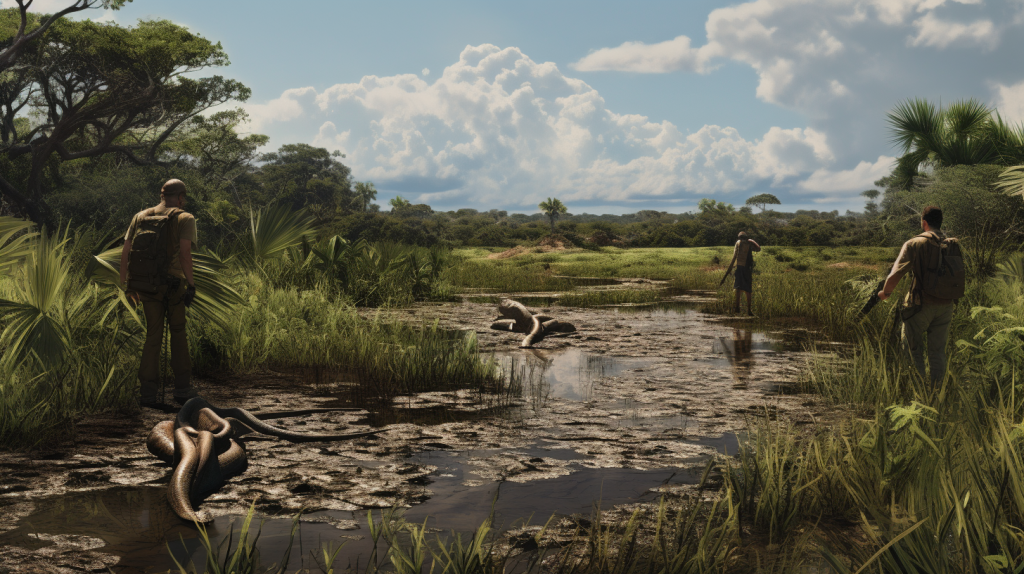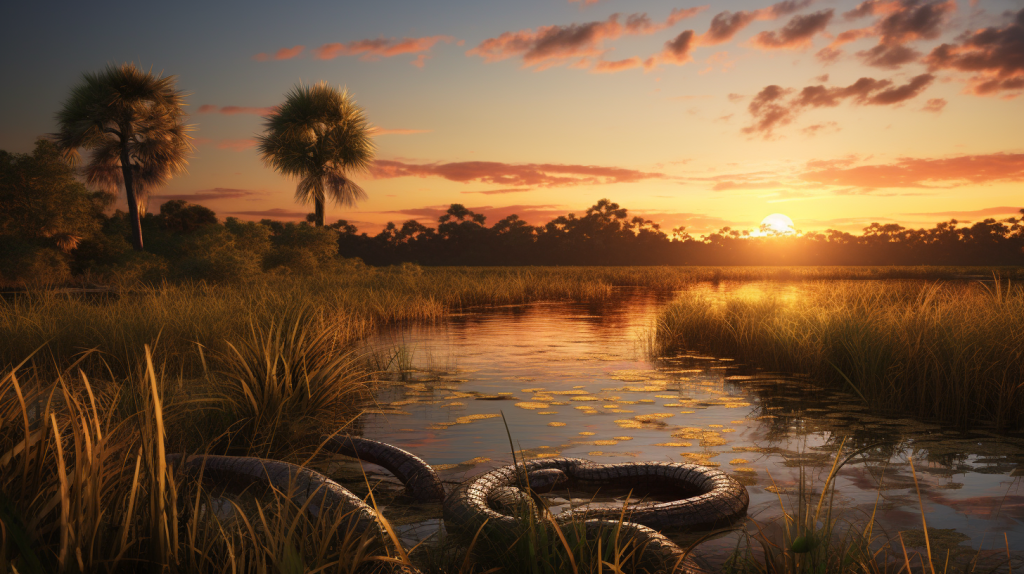The south’s diverse landscapes have long been home to an array of reptilian residents, including some infamous snakes like the Burmese python, making snake hunting in Florida necessary. With concerns about the impact of invasive species on the state’s delicate ecosystems, the practice of snake hunting has emerged as a strategy to mitigate these effects. However, beneath the surface of this seemingly straightforward solution lies a web of complexities that intertwine with the environment, the economy, and ethical considerations.
A Double-Edged Sword: The Appeal and Complications of Snake Hunting
The call of snake hunting resonates with a diverse group of enthusiasts drawn by a medley of motivations—be it the thrill of adventure, the desire for a deep connection with the natural world, or the promise of financial gains.
The swamps and forests of Florida become the backdrop for this enthralling pursuit, as individuals embark on quests to track down elusive serpents. The heart-pounding excitement of the chase and the triumph of capturing these enigmatic creatures paint an alluring picture. Yet, beneath the surface of this captivating narrative lies a landscape of intricacies and complexities.
Like a double-edged sword, snake hunting brings with it the potential for both benefits and repercussions, intertwining human desires with the intricate workings of ecosystems. As the quest unfolds, the harmony between the allure of the hunt and the delicate equilibrium of nature becomes a puzzle that demands careful consideration and mindful action.
Unraveling the Ecosystem Impact: A Delicate Balance at Stake
Beneath the surface of snake hunting lies a complex web of ecological consequences that extend far beyond the initial act. While the intention to curb invasive snake populations seems straightforward, the impact of such actions resonates deeply within the intricate tapestry of ecosystems.
The harmonious interplay of predator-prey relationships, delicately woven food webs, and the intricate dance of biodiversity can be profoundly affected by the removal of certain snake species. In the absence of these serpentine inhabitants, the fabric of the ecosystem undergoes a transformation, potentially leading to unforeseen shifts in species abundance and behavior.
The repercussions of disrupting this delicate balance can ripple through the environment, influencing the dynamics of native species and ecosystems, and even prompting a chain reaction of effects that resonate far beyond the scope of the hunt itself.
As snake hunting casts its net, it unveils the intricate threads that connect all living things, underscoring the need for a holistic understanding of the environment’s interconnectedness and the ramifications of intervening in nature’s intricate design.
Ecology and Economy Collide: The Economic Side of Snake Hunting
In the heart of Florida’s wild landscapes, the pursuit of snake hunting intertwines with the realm of economics, offering a unique blend of adventure and financial opportunity. The practice has become a catalyst for economic activities that ripple through local communities.
Guided snake hunting tours invite participants to delve into the heart of nature’s mysteries while simultaneously bolstering the livelihoods of guides and local businesses. The allure doesn’t end there—snake leather products and the prospect of tourism centered around this captivating pursuit further contribute to economic growth. Yet, as the coffers fill with monetary gains, a careful balancing act is imperative.
The economic prosperity that snake hunting can usher in must be weighed against the potential ecological repercussions. The harmony between economic interests and the preservation of delicate ecosystems requires a measured approach that respects the intricate interplay between financial aspirations and the well-being of the environment that sustains us all. As the realms of ecology and economy collide, the challenge lies in fostering a symbiotic relationship where both thrive in harmony.
The Ripple Effect: Unexpected Consequences of Snake Population Reduction
The moral compass of snake hunting navigates the fine line between conservation and eradication. While targeting invasive species is crucial for preserving native ecosystems, it’s essential to consider the potential consequences of diminishing the populations of certain snakes. The practice of responsible hunting, emphasizing selective removal and adherence to regulations, becomes paramount in maintaining a harmonious ecosystem.
The complex interactions within ecosystems mean that the effects of snake hunting can extend beyond the immediate goals. Reduced snake populations might lead to an increase in the prey species they once kept in check, triggering a domino effect that influences vegetation, other animals, and even human activities. Thus, the impact of snake hunting is as intricate as the ecosystems it aims to safeguard.
A Dance of Balance: Ecological Management and Coexistence
The challenge lies in finding a harmonious balance between the conservation of native species and the control of invasive ones. Snake hunting underscores the importance of holistic ecological management that considers not only individual species but also their roles within the larger tapestry of life. Coexistence, rather than eradication, might offer a more sustainable path forward.
Final Remarks About Snake Hunting In Florida
Snake hunting in Florida, while offering a potential solution to the challenge of invasive species, poses a multi-faceted conundrum. As hunters venture into the wild in search of these elusive reptiles, they step into an intricate dance with nature’s delicate rhythms.
Striking the right chords between environmental preservation, economic interests, and ethical considerations remains a perplexing puzzle that requires collective understanding, adaptive strategies, and an unwavering commitment to maintaining the intricate balance of Florida’s diverse ecosystems.
FAQs About Impacts of Snake Hunting in Florida
Q: Why is snake hunting practiced in Florida?
A: Snake hunting is practiced in Florida to control invasive snake populations that can disrupt native ecosystems.
Q: What are the potential ecological consequences of snake hunting?
A: Snake hunting can disrupt predator-prey relationships and alter the balance of native ecosystems.
Q: Are there economic benefits to snake hunting?
A: Yes, snake hunting can contribute to local economies through activities like guided tours and product sales.
Q: What ethical considerations are associated with snake hunting?
A: Ethical considerations revolve around maintaining ecological balance, responsible hunting practices, and preserving native species.
Q: How does snake hunting impact the broader ecosystem beyond snake populations?
A: Snake hunting can have unintended consequences, such as shifts in prey species, vegetation, and overall ecosystem dynamics.
References:
- Florida Fish and Wildlife Conservation Commission (FWC). (n.d.). Python Removal Program. https://myfwc.com/wildlifehabitats/nonnatives/python/removal-program/
- The Nature Conservancy. (2022). Florida Snake Hunting: A Nature-Based Solution. https://www.nature.org/en-us/what-we-do/our-insights/perspectives/florida-snake-hunting/
- National Geographic. (2013). Florida Pythons: Catch and Kill?. https://www.nationalgeographic.com/news/2013/8/130808-florida-everglades-snakes-python-hunters-animals-science/
- U.S. Fish and Wildlife Service. (n.d.). Invasive Species: Python Elimination Program. https://www.fws.gov/verobeach/python-hunt.html
- Florida Museum. (2023). Florida’s Invasive Species: Snakes. https://www.floridamuseum.ufl.edu/florida-animals/snakes/floridas-invasive-snakes/





